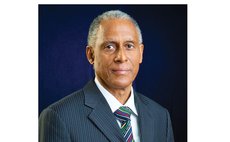Consumed and Obsessed by Self …
The embattled leader of Syria, President Bashar Hafez al-Assad - in power since July 2000 - like all dictators who have preceded him, refuses to voluntarily relinquish power. This is so, in spite of the fact that there are living and departed examples of what happens to dictators like him. He will not learn, indeed, he cannot learn. In his depraved mind, he will be the lucky dictator who will somehow change the course of history and defy the overwhelming historical and empirical evidence. In power for almost thirteen years, he expects, at his relative youth, to be his people's ruler for at least twenty-two more years, assuming three scores and ten as the natural limit to life. If truth be told, he will need to be in power for a little over two more decades before his first born reaches 34 (or thereabouts) to inherit the Presidency from him. He has probably calculated this already.
Hence, to this warped and arrogant mind, typical of dictators, the people of Syria are out of order to challenge his rights over the property his daddy handed him. His advisors, characteristic of expert sycophants, are saying "Mr. President, you are doing a great job and in fact, if it were not for you, Syria would not be where it is today so thank God we have you! At any rate, Mr. President, who else can lead us from among the 2.5 million Syrians in the population, if not you?"
All of this is perhaps very easy to explain. His father bequeathed power and Syria to him personally. Indeed, he was groomed for several years as the natural and logical successor to his father's real estate with its accompanying population. Hence, according to Wikipedia:
When the elder Assad died in 2000, Bashar was appointed leader of the Ba'ath Party and the Army, and was elected president unopposed in what the government claimed to be a massive popular support (97.2% of the votes), after the Majlis al-Sha'ab (Parliament) swiftly voted to lower the minimum age for candidates from 40 to 34 (Assad's age when he was elected). On 27 May 2007, Bashar was approved as president for another seven-year term, with the official result of 97.6% of the votes in a referendum without another candidate.
As an intelligent population, let us regard a few points here. Firstly, the extract above speaks to the practice of nepotism which Wikipedia defines as favouritism granted to relatives regardless of merit. Another type of favouritism is cronyism which is partiality towards long-time friends. Cronyism involves placing them (i.e., friends) in positions of authority, regardless of their qualifications or competence. In that regard, cronyism is actually the direct opposite of the principle of meritocracy.
Hence, in a country where nepotism or cronyism is practised, people rise to important and usually well-rewarded positions not because they are diligent, or qualified or competent; to be sure, these attributes are secondary to blind loyalty, blood-relatedness and friendship. If we claim to be intellectually alert and sophisticated as Dominicans, it is not difficult to come to the conclusion that in any organization or country where cronyism or nepotism is practised, productivity, progress and motivation will be ruthlessly suffocated. I should think no self-respecting population would think nepotism or cronyism is desirable. Clearly, some populations do not mind, if we are to equate acceptance of a principle or practice as support. So it appears that in 2000, Syrians accepted (to use a safer or less prejudicial word) nepotism.
What else does the extract claim Syrians did? It says that al-Assad "was elected president unopposed in what the government claimed to be a massive popular support (97.2% of the votes)." This was another warning sign and signal for the people of Syria. In fact, if the polls were not rigged or manipulated ("try your best", as Jamaicans would say), it means Syrians, the same ones who are dying in the streets today, almost totally endorsed nepotism, and by extension, the decision of the father to bequeath Syria to the son, Bashar Hafez al-Assad. The people apparently liked it and they embraced it. Of course, as happens in countries where elections are rigged, the party in power rigs or manipulates the election and then turns around and says that the outcome (which is skewed of course) is what the people desired. This is really convoluted thinking, if not downright disingenuous. Those politicians actually, over time, believe their own lies.
Thus Bashar Hafez al-Assad manipulates or "manages" his victory and believes he has won fair and square. To some extent, you cannot totally blame him because, after all, Syrians were apparently happy with that and, as such, deserved it (for argument sake). Hence the second point one can isolate from the extract above.
The extract isolates another very important point, the third. Hence, the Parliament, "swiftly voted to lower the minimum age for candidates from 40 to 34 (Assad's age when he was elected)." Wrap your mind around this one! The Parliament of the country, supposedly comprising educated adult men convenes to deliberately lower the minimum age at which one can become President of Syria so as to accommodate one man out of the many possible candidates. In essence, the Syrian Constitution is treated as a personal document to be operated at the whim or caprice of a single human being. Again, I have to conclude that this was fine with Syrians because they did not stop it then. Surely, a few people must have been against this but the "majority" (even when rigged) must have its way.
Here again, some Caribbean political analysts would find no fault in this calculated breach of the Constitution of Syria because the election of 2007 hands the President another almost absolute endorsement of 97.6% of the votes. Moreover, so great is he, there are no other candidates. Surely, this man cannot be blamed for thinking that Syria belongs to him or that his people are fully behind him. The paradox is that almost four years later, in January 2011, protests against such a popular leader commenced. Are the people who are fighting his regime today to be simply dismissed as "haters" who merely want to cause trouble and are envious of a respectable, upstanding and innocent-looking leader? Should they stop fighting for human rights simply to maintain the country's "good name"?
In essence, dictators are sick. The tendency towards dictatorship is pathological for them. Like Muammar Gaddafi, for instance, the Syrian leader is prepared to commit genocide on his population if they will not accept that he was born to rule Syria. His eldest offspring, being socialized in that culture, must also assume that when he grows up, he must take over his father's real estate. His British-born mother – the First Lady of Syria - undoubtedly has not disabused her child's mind of this notion. Why should she do so if continuity in power assures her of all the brand names in designer clothing (GAP, CHANEL, GUCCI, GIORGIO ARMANI) and other things that the masses in Syria will never have?
For dictators like Syria's President, and no doubt his wife, the death of 20,000 Syrians is a small price to pay for holding on to power and enjoying the life of prosperity and wealth for the First Family. Hopefully, the Syrian military, the President's advisors, his cronies, his supporters, and so on, will come to the realization, before further bloodshed, that a man who holds on to power while people are slaughtered daily cannot love anyone else, but himself. Unfortunately, many more will have to suffer and many more will have to die before that day comes. Let us hope for his sake and that of his wife and very young children, his calculation of events is much better than that of Muammar Gaddafi.
(c) Dr. Francis O. Severin is the Acting Director of the University of the West Indies Open Campus Country Sites.




